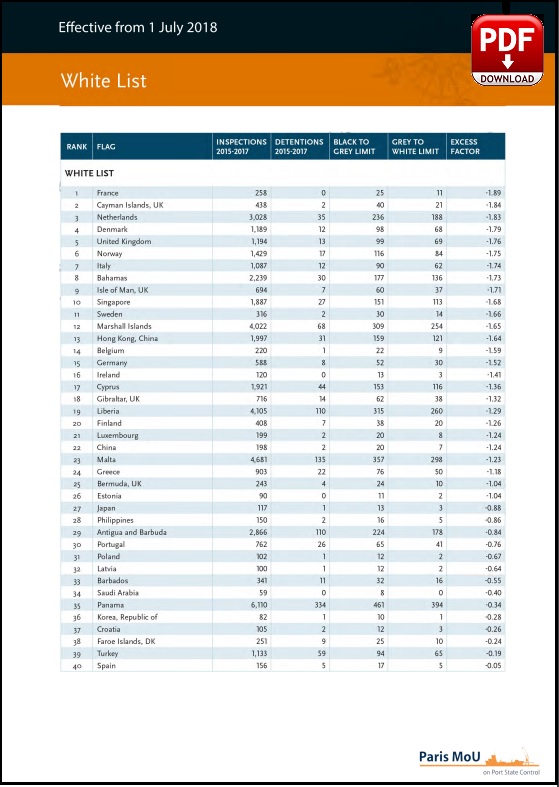
(www.MaritimeCyprus.com) At its 51st meeting last month, the Paris MoU Committee approved the 2017 inspection results and adopted new performance lists for flags and Recognized Organizations (ROs). These lists will take effect from 1 July 2018.
The “White, Grey and Black (WGB) List” presents the full spectrum, from flags with a high performance to flags with a poor performance that are considered high or very high risk. It is based on the total number of inspections and detentions over a 3-year rolling period for flags with at least 30 inspections in the period.
On the “White, Grey and Black list” to be used for the calculation of the Ship Risk Profile form 1 July 2018, a total number of 73 flags are listed: 40 on the “White List”, 20 on the “Grey List” and 13 on the “Black list”. In last year’s list the number of flags listed also 73 flags; 42 on the “White List”, 19 on the “Grey List” and 12 on the “Black List”.
The “White List” represents flags with a consistently high performance record. Compared to last year’s list, the number of flags on the “White List” has decreased by two. The Republic of Korea has moved back to the “White list” after one year on the “Grey List”. Poland has entered the “White List” as well.
Flags with an average performance are shown on the “Grey List”. Their appearance on this list may act as an incentive to improve and move to the “White List”. At the same time flags at the lower end of the “Grey List” should be careful not to neglect control over their ships and risk ending up on the “Black List” next year.
On this year’s “Grey List” a total number of 20 flags are recorded. Last year the “Grey List” lists 19 flags. New on the “Grey List” are the Islamic Republic of Iran, Kazakhstan, the Russian Federation and the United States of America, which were on the “White List” last year. From being a non-listed flag last year, Tuvalu is now on the “Grey List”.
New on the “Black List” is Ukraine.
For several years the Committee has closely monitored the performance of ROs acting on behalf of flags. To calculate the performance of the ROs, the same formula to calculate the excess factor of the flags is used. A minimum number of 60 inspections per RO are needed before the performance is taken into account for the list. In the RO performance table to be used for the calculation of the Ship Risk Profile from 1 July 2018 34 ROs are listed.
Compared with last year’s performance level, a small shift in RO performance in 2017 can be noticed. This year three ROs are in the very low performing position against none last year. Three ROs are in the low performing positions compared to four in the last year and 17 ROs are in the medium position of the list compared to 19 in the last year.
Details of the responsibility of the ROs for detainable deficiencies have been published since 1999. When one or more detainable deficiencies are attributed to an RO in accordance with the Paris MoU criteria, this is recorded as “RO responsible” and the RO is informed. Out of 685 detentions recorded in 2017, 99 or 14.5% were considered RO related compared to 13.9% in 2016.
On 1 July 2018 the performance lists will be used for calculating the Ship Risk Profile. Flags on the “Grey List” and “Black List” will be subject to more stringent banning measures which are in force since 1 January 2011.
Click on below image to view the Paris MoU 2017 performance lists for flag states and recognized organizations.
 Source: Paris MOU
Source: Paris MOU













Reblogged this on Brittius.